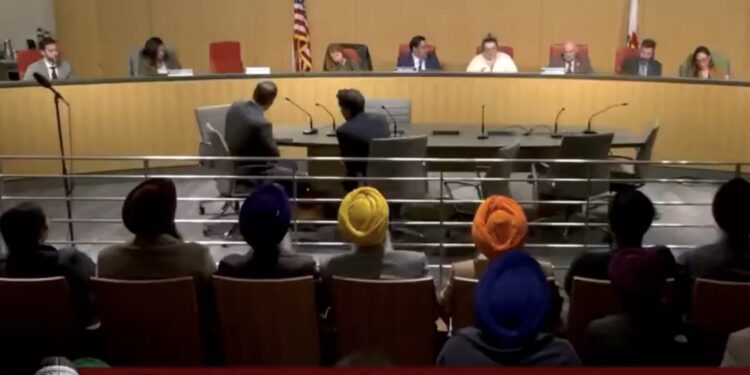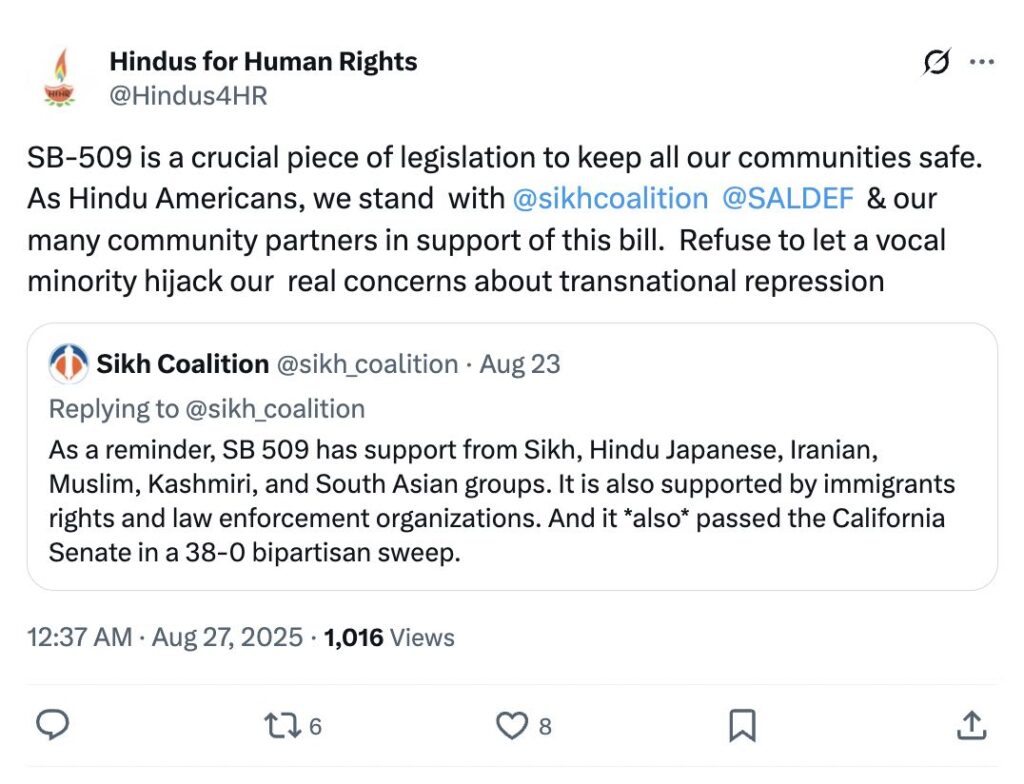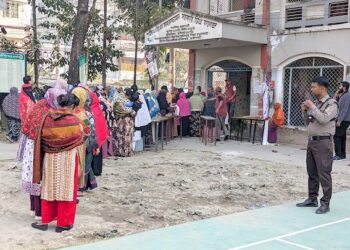California’s Senate Bill 509 (SB 509), a landmark measure to combat transnational repression by foreign governments, has passed both houses of the state legislature and now awaits Governor Gavin Newsom’s signature as of September 13, 2025. The bill, mandating specialised law enforcement training to identify and respond to threats against diaspora communities, has ignited heated debate within California’s South Asian diaspora. While Sikh organisations, some Hindu groups, and the Indian American Muslim Council champion the bill as vital for protecting vulnerable communities, other Hindu advocacy groups oppose it, warning of potential misuse and profiling.Introduced by Senator Anna M. Caballero (D-Merced), SB 509 establishes a state policy to safeguard individuals and organisations from transnational repression—actions by foreign entities to intimidate, harass, or silence dissidents, activists, and ethnic minorities abroad. The bill requires the California Office of Emergency Services, through its Specialised Training Institute, and in collaboration with the Commission on Peace Officer Standards and Training, to develop mandatory training for state and local police by January 1, 2027. The training focuses on recognising tactics such as surveillance, coercion, and misuse of international mechanisms like INTERPOL notices, while promoting coordination with federal agencies like the FBI.Sikh and
Muslim Support and Broad Coalition
Sikh American organisations lead the support for SB 509, viewing it as critical for addressing documented threats. “The passage of SB 509 is more than a legislative milestone; it marks a strategic inflection point for equity and justice,” said Kiran Kaur Gill, Executive Director of the Sikh American Legal Defense & Education Fund (SALDEF). “SALDEF is proud to have catalysed a coalition that spans Sikh Americans, allied organisations, and directly affected Californians, demonstrating how diverse communities coming together can translate shared concern into meaningful policy.” The Sikh Coalition highlighted the bill’s unanimous Senate passage (38-0) in June and its Assembly approval on September 11, 2025. “Our communities are speaking out because these threats have hit home, and we believe that California, home to one of the most diverse populations in the country, can and must lead,” said Puneet Kaur, Senior State Policy Manager at the Sikh Coalition. With over 30,000 Sikhs in the Central Valley alone, supporters argue the bill bridges critical gaps in local policing, equipping officers to distinguish repression from legitimate advocacy.The Indian American Muslim Council (IAMC) has also endorsed SB 509, joining the coalition of supporters. According to reports, IAMC views the bill as a necessary step to protect diaspora communities, including Muslims, from authoritarian regimes’ overreach, aligning with their advocacy against human rights abuses. Their support reflects concerns about transnational threats faced by Indian American Muslims, particularly in light of global incidents targeting dissidents.
Diverse Hindu Perspectives
Not all Hindu organisations oppose the bill. Hindus for Human Rights (HfHR), a progressive advocacy group, has actively supported SB 509, aligning with Sikh, Muslim, Iranian, Uyghur, and other diaspora groups. “We stand in solidarity with all communities facing transnational repression, as it undermines the fundamental rights we cherish,” said Sunita Viswanath, Executive Director of HfHR in a post on X. “This bill ensures law enforcement is trained to protect those targeted by authoritarian regimes, fostering safety for all Californians, including Hindus who face similar threats.” HfHR’s stance, echoed in their August 26, 2025, X post, reflects their commitment to human rights across communities, including against abuses by the Indian government targeting dissidents abroad.Conversely, groups like the Hindu American Foundation (HAF) and the Coalition of Hindus of North America (CoHNA) strongly oppose SB 509, arguing its vague definitions of “proxies” and “repression” could mislabel legitimate advocacy—such as countering perceived extremism—as foreign interference. “Under the guise of protecting ‘dissent,’ SB 509 would empower law enforcement to criminally prosecute diaspora groups and community organisations who merely speak out against terrorism and extremism, by accusing them of being foreign ‘agents,’” warned Samir Kalra, Managing Director of HAF, in a July 15, 2025, X post. CoHNA highlights rising anti-Hindu incidents, including vandalism of at least four temples in California since 2023, often marked with pro-Khalistan graffiti tied to the Sikh separatist movement. “The Hindu community approached this legislative process in good faith, believing lawmakers would prefer to make a law respectful of the diversity of California’s communities,” said Sudha Jagannathan, a CoHNA board member, in an X post. These groups fear the bill overlooks domestic threats to Hindus and risks profiling Indian Americans amid India-Khalistan tensions.
Current Status and Broader Implications
As of September 13, 2025, SB 509 awaits Governor Newsom’s decision, with a signing deadline approaching. Sikh groups, IAMC, and allies like HfHR urge swift approval, with the Sikh Coalition posting on X on September 11, 2025, urging supporters to contact Newsom to sign the bill. Meanwhile, HAF and CoHNA campaign for a veto or amendments to ensure neutrality, as seen in HAF’s June 17, 2025, X post warning of profiling risks. The divide underscores the complex dynamics within California’s South Asian diaspora—over one million strong—where global human rights advocacy intersects with local concerns about division. Freedom House’s report of 854 global transnational repression cases from 2014 to 2022 highlights the bill’s urgency, but opponents argue it lacks safeguards to prevent misuse.The outcome of SB 509 could set a precedent for other states, as California’s diverse population navigates the balance between diaspora protections and community cohesion. For now, the South Asian community remains divided, awaiting a resolution that addresses both safety and fairness.












